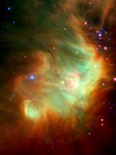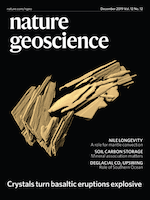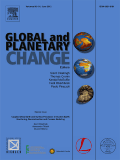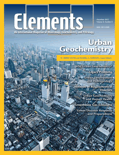
Annual Review of Earth and Planetary Sciences
Scope & Guideline
Bridging Earth Sciences and Astronomy for a Sustainable Future
Introduction
Aims and Scopes
- Geological Processes and Earth's Structure:
The journal focuses on the physical and chemical processes that shape the Earth's structure, including tectonics, volcanism, and sedimentology. - Climate Change and Environmental Dynamics:
A significant emphasis is placed on understanding climate change impacts, feedback mechanisms, and historical climate variations, integrating paleoclimatology with contemporary climate science. - Planetary Science and Comparative Planetology:
Research on planetary bodies, including their geology, atmospheres, and potential for life, is a core focus, particularly studies comparing Earth with other celestial bodies. - Biogeochemical Cycles and Ecosystem Interactions:
The journal explores biogeochemical cycles, such as carbon and nitrogen cycles, and their relationship with ecosystems, highlighting the interconnectedness of geological and biological processes. - Innovative Methodologies and Technological Advances:
The incorporation of new technologies, such as machine learning and advanced geochemical techniques, reflects the journal's commitment to methodological innovation in earth and planetary sciences.
Trending and Emerging
- Interdisciplinary Approaches to Climate Change:
There is a growing focus on integrated studies that combine climate science with geological, ecological, and technological perspectives, addressing the multifaceted nature of climate change. - Deep Earth and Subsurface Research:
Emerging themes related to the composition and behavior of Earth's lower mantle and subsurface processes indicate an increasing interest in understanding the deep Earth and its influence on surface phenomena. - Astrobiology and the Search for Life Beyond Earth:
Research related to astrobiology, including studies of planetary bodies like Mars and icy moons, reflects an expanding interest in the potential for life in extreme environments. - Hydrological Cycles and Water Resources:
Recent publications emphasize the importance of understanding hydrological cycles, particularly in the context of climate change and its implications for water resources and management. - Technological Innovations in Earth Sciences:
The application of advanced technologies, including machine learning and remote sensing, is a trending theme, enhancing data collection and analysis in earth and planetary sciences.
Declining or Waning
- Traditional Volcanology Studies:
Although volcanic studies remain relevant, there has been a noticeable decline in papers solely focused on traditional aspects of volcanology, as newer interdisciplinary approaches take precedence. - Static Earth Models and Theories:
Research centered around static models of Earth's structure is waning, giving way to more dynamic and complex models that account for ongoing geological processes and interactions. - Historical Geology Without Climate Context:
Papers that focus solely on historical geology without integrating climate impacts and contexts are becoming less frequent, as the field increasingly emphasizes the relationship between geological history and climate. - Narrowly Focused Regional Studies:
There appears to be a decline in the publication of studies that focus exclusively on localized regional geology, with a trend towards more global or comparative analyses. - Traditional Mineralogy:
Research specifically dedicated to traditional mineralogy is less prominent, as there is a broader interest in geochemistry and how minerals interact with biological and environmental processes.
Similar Journals

Nature Geoscience
Innovating Solutions for a Sustainable Earth.Nature Geoscience, a premier journal published by NATURE PORTFOLIO, provides a platform for the dissemination of high-quality research in Earth and Planetary Sciences. With an impressive impact factor reflecting its significance — ranking in the 99th percentile and positioned at #1 out of 195 in Scopus Ranks within its category, this journal is a leading authority in its field. Since its inception in 2008, it has fostered interdisciplinary collaboration, addressing critical challenges such as climate change, natural disasters, and resource management. Although it does not offer Open Access, the journal is accessible through various research libraries, ensuring that vital findings reach a broad audience. The journal's esteemed reputation in the Q1 quartile of Earth and Planetary Sciences makes it an essential resource for researchers, professionals, and students aiming to advance their understanding of geoscientific phenomena.

GLOBAL AND PLANETARY CHANGE
Connecting Research to Global Sustainability ChallengesGLOBAL AND PLANETARY CHANGE, published by Elsevier, is a premier international journal focused on the critical issues surrounding environmental science, climate change, and planetary dynamics. Since its inception in 1989, this journal has established itself as a leading voice in the field, currently holding a prestigious Q1 ranking in both Global and Planetary Change and Oceanography as of 2023. With a remarkable influence reflected in its Scopus rankings—15th in Earth and Planetary Sciences and 34th in Global and Planetary Change—it serves as an essential platform for researchers, professionals, and students. The journal provides a comprehensive examination of cutting-edge research findings and innovative developments that address the urgent challenges facing our planet. Although it is not an Open Access journal, it remains a vital resource for anyone keen to contribute to or stay informed on the ever-evolving discourse of global environmental change, promoting sustainable solutions for the future.

GEOSCIENCES JOURNAL
Innovating Solutions for a Sustainable Future.Welcome to the GEOSCIENCES JOURNAL, a pivotal publication in the fields of Earth and Planetary Sciences and Environmental Science, proudly presented by the Geological Society of Korea. Established in 1997, this journal has become a prominent platform for researchers, professionals, and students, offering a rich collection of peer-reviewed articles that explore a diverse array of geoscientific topics. With an impressive Q2 ranking in both Earth and Planetary Sciences and Environmental Science categories for 2023, it stands as an essential resource in the academic community. Though it operates under a traditional subscription model, GEOSCIENCES JOURNAL remains dedicated to advancing knowledge through rigorous research. Addressed from its headquarters in Seoul, South Korea, the journal aims to foster a deeper understanding of geosciences, encouraging innovation and collaboration in tackling today’s environmental challenges.

Geosciences
Exploring the Earth's Mysteries, One Article at a Time.Geosciences is a prestigious open-access journal published by MDPI, dedicated to advancing research in the field of Earth and Planetary Sciences. Since its inception in 2011, this journal has fostered a collaborative environment for the dissemination of innovative ideas and findings, contributing significantly to the academic community's understanding of complex geological processes. The journal has achieved a commendable 2023 ranking in the second quartile (Q2) within its category, highlighting its impact and relevance in the field, with a Scopus rank of #41 out of 195 journals, placing it in the 79th percentile. With an aim to span a broad range of topics from environmental geology to planetary exploration, Geosciences is pivotal for researchers, professionals, and students looking for an accessible platform to share their work and stay informed of the latest developments. As a fully open-access journal, it ensures that high-quality research is freely available, fostering greater dissemination of knowledge across the globe.

Geosphere
Connecting Researchers to the Heart of Earth ScienceGeosphere is a premier open access journal published by the Geological Society of America, Inc., dedicated to advancing the fields of geology and stratigraphy. Since its inception in 2005, this journal has established itself as a critical platform for sharing high-quality research, evidenced by its robust positioning in the 2023 Scopus rankings, where it holds the 12th rank in stratigraphy and 75th in geology. With an impressive impact factor and a commitment to open access since 2018, Geosphere facilitates the dissemination of significant findings to a global audience, making it an essential resource for researchers, professionals, and students alike. The journal's scope includes a wide range of topics related to Earth and Planetary Sciences, encouraging interdisciplinary collaboration and innovation. Based in the United States, Geosphere continues to foster a community dedicated to understanding the Earth's processes and resources, ensuring that it remains at the forefront of geological research.

Science China-Earth Sciences
Empowering Researchers with Open Access to Groundbreaking Findings.Science China-Earth Sciences, published by SCIENCE PRESS, stands as a leading journal in the field of Earth and Planetary Sciences, currently holding a prestigious Q1 ranking in the 2023 category and positioned at Rank #12 out of 195 in Scopus, reflecting its significance with an impressive 94th percentile. Specializing in a wide array of topics including geological processes, environmental science, and planetary studies, the journal serves as a vital resource for researchers, professionals, and students alike, fostering interdisciplinary collaboration and advanced scientific discourse. With a commitment to accessibility and knowledge dissemination, Science China-Earth Sciences offers an Open Access model, ensuring that high-quality research is available to a global audience. Situated in Beijing, China, this journal is dedicated to promoting innovative scientific advancements and understanding the complexities of our planet from 2010 to 2024 and beyond. As such, it remains essential for anyone engaged in the dynamic and evolving field of Earth sciences.

Journal of Geosciences
Navigating the Frontiers of Earth's ScienceJournal of Geosciences is a distinguished peer-reviewed journal published by CESKA GEOLOGICKA SPOLECNOST, based in the Czech Republic, that serves as a vital platform for the dissemination of innovative research in the field of Earth and Planetary Sciences. With an ISSN of 1802-6222 and E-ISSN of 1803-1943, this journal has established its significance within the academic community, evidenced by its Q3 ranking in both Earth and Planetary Sciences and Geology. The journal covers a broad array of topics, making it an essential resource for researchers, professionals, and students interested in geoscientific advancements and discoveries. The Journal of Geosciences reflects a commitment to high-quality scholarship, embracing a variety of methodologies and interdisciplinary approaches, and provides open access to its content, thereby encouraging global collaboration and knowledge sharing among geoscientists. With a publication history converging from 2007 to 2024, it continues to be a prominent venue for critical conversations and developments in the ever-evolving field of geosciences.

SOLAR SYSTEM RESEARCH
Connecting Researchers to the Wonders of the UniverseSOLAR SYSTEM RESEARCH, published by Pleides Publishing Inc, offers a comprehensive platform for the exploration and dissemination of scientific knowledge in the fields of Astronomy, Astrophysics, and Space and Planetary Science. With its origins tracing back to 1969, this journal provides a vital resource for researchers and professionals seeking to deepen their understanding of the solar system's complexities, including planetary formation, extraterrestrial geology, and the dynamics of celestial bodies. Although categorized in the Q4 quartile for both relevant disciplines, SOLAR SYSTEM RESEARCH remains committed to publishing high-quality research that contributes to advancing contemporary scientific discourse. Dedicated to fostering collaboration and innovation, the journal is indexed in Scopus and adheres to rigorous academic standards, making it an essential resource for students and professionals alike pursuing the latest developments in solar system studies.

Elements
Exploring the Foundations of Earth and Planetary SciencesElements is a premier academic journal published by the Mineralogical Society of America, dedicated to advancing knowledge in the fields of Earth and Planetary Sciences and Geochemistry and Petrology. Since its inception in 1973, this journal has established itself as a leading source of impactful research, evidenced by its prestigious Q1 rankings in both categories in 2023, placing it among the top journals globally with Scopus ranks of #18 and #23, respectively. Elements is uniquely positioned to foster interdisciplinary dialogue, offering a platform for groundbreaking studies that explore the fundamental processes shaping our planet. Although it operates without an open access model, its rigorous peer review process guarantees the integrity and quality of published work, making it an essential resource for researchers, professionals, and students eager to stay abreast of the latest developments in mineralogy and earth sciences. With a commitment to excellence, Elements continues to push the boundaries of our understanding of geological phenomena and their implications for both science and society.

AGU Advances
Bridging Knowledge Across Earth and SpaceAGU Advances, published by the American Geophysical Union, is a premier Open Access journal established in 2020, dedicated to advancing the field of Earth and Planetary Sciences. With an impressive Q1 ranking in the 2023 category of Earth and Planetary Sciences (miscellaneous) and a Scopus rank of #81/195, it serves as a vital platform for researchers, professionals, and students to share their findings and innovations. The journal fosters a collaborative environment, encouraging interdisciplinary approaches and high-quality research that addresses the fundamental questions of our planet and beyond. With its commitment to accessibility, AGU Advances ensures that cutting-edge research is available to a global audience, supporting the dissemination of knowledge that is crucial for addressing current and future scientific challenges. For those keen on contributing to or accessing groundbreaking studies in this dynamic field, AGU Advances is an invaluable resource.